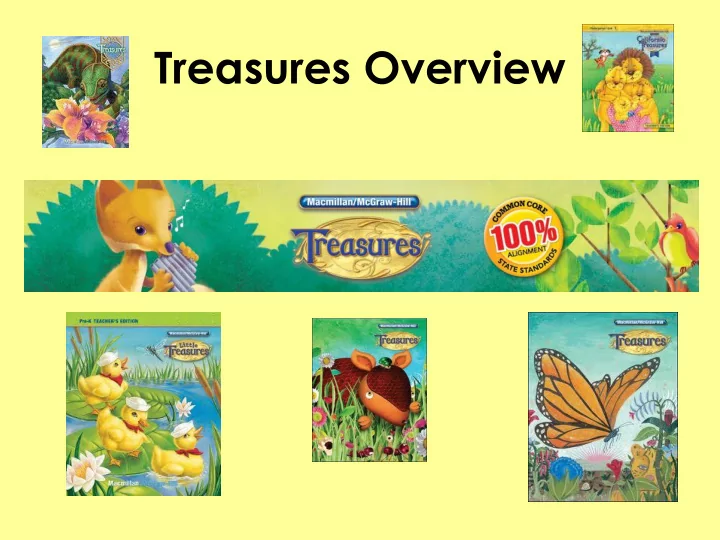

Treasures Overview
District Focus • High level of meaningful student discussion throughout the day. • Higher level questioning by teacher and students. • Differentiated instruction. Purposeful planning, guided by student results and informal observations.
Daily Schedule (120 min reading/writing total for the day • 15 min whole group (Oral Language, Vocabulary) • 15 min stations & small group • 15 min whole group (Comprehension/Vocabulary) • 15 min stations & small group • 15 min whole group (Phonics/Phonemic Awareness/High Frequency words ) • 15 min stations & small group • 30 min Writing/Grammar/Conferencing *Please note: times are approximate
Smart Start • Kindergarten-1 st 3-weeks • 2 nd -5 th grade 2-weeks • Assess students and create groups Oral Reading Fluency and Comprehension Assessment • Establish procedures and routine • Review station procedure • Assign student jobs • Complete organization of classroom library by lexile and genre
Whole Group Instruction • White pages- Whole group (perky pace): This is a time for teachers to introduce, model and explain through think alouds and questioning • All read alouds in white pages are done by the teacher to model fluency and reinforce skills. • “Round robin” and “ Popcorn reading” are not best practices, and should not be implemented.
Whole Group Instruction • Whole-group instruction introduces tested skills and lets teachers identify areas of students weakness. It is scaffolded, progressing from easier to more complex content. • During this introductory period, skills and strategies are modeled for students and practice is guided. This provides students opportunities to learn before they take on independent practice or activities.
Monitoring Student Progress • During whole group instruction Quick Checks are identified throughout each lesson plan. They identify the tested objectives that are important to the lesson and important for future assessment. • During instruction for any tested skill, teachers should observe student responses, both verbal and written to determine whether or not students achieve mastery.
Monitoring Student Progress • Some questions to consider: • Have students approached the level of the skill but not mastered it? • Have students reached level with the skill but could consolidate their learning with more practice? • Are students beyond level and ready to extend their learning? • For each category there is a plan for small-group instruction.
Small group Instruction • Small groups should be no more than 6 students on same level or with same academic need • Utilize leveled readers • Yellow pages are for small group instruction • Rotation chart with a station rotation routine in place
Small group Instruction • Refer to the weekly small group lesson plan for lessons targeting the weekly skills. • The Suggested Lesson Plan for Small Groups includes instructional options for every skill, every group, everyday. It also includes suggestions and guidelines for managing these small group lessons.
Keeping Track of student progress • Teachers may utilize a binder to make informal observations on students during small group instruction. The binder may have a page for each group or each student. These pages should include daily anecdotes on student performance. For example. • Larry was unable to identify words with the long O sound. Assigned page 23 from the Approaching level Practice Book.
Student Anecdotal Binder
Routine and Procedure • Instruction management begins with the establishment of a predictable, cooperative, learner friendly environment and structured daily routines. • Developing procedures is the first step in establishing daily routines and is critical to effective classroom management. You can accomplish this through clearly communicating expectations for student behavior during the various activities that take place in your classroom every day. • Source: Managing Small Groups A How-to Guide
Stations • Students should not travel in a group. Multilevel learners at one station. • Leveled activities to meet all student needs • 4-6 stations • Listening station • Writing station-Journal writing, Daily Writing prompt • Word works-vocabulary • Phonics and Word study • Reading stations-Independent and practice
Center Ideas-Writing
Writing Station
Station sample
Writing – sample station
Phonics and Word Study
Portable Writing Station-sample
Reading – sample station
Word Works-Phonics
Listening Station
White Board Station: Students can...
Rotation Chart – sample
Rotation Chart – sample
Classroom Management Suggestions • There are weekly contracts, rotation charts, and a how-to manual for small- group management tools to help teachers organize and communicate plans for student work. • www.connected.macgraw-hill.com • Teacher Resources
Word Wall • Kindergarten through Third grade must still have a Dolch Word Wall displayed. • The word wall is for the high frequency words only. Weekly vocabulary works should not be added to this word wall. • Kindergarten - Student names can be posted on the side like in the past. • Interactive and theme word walls may also be displayed throughout the room. (math, science, writing, social studies, themed…)
Weekly Vocabulary • Station Idea: • Marzano’s academic vocabulary procedure, sheets and binders, may be used as a station with the weekly vocabulary.
Recommend
More recommend